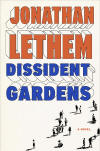Dissident Gardens
Dissident Gardens begins in Queens during the post-war years, when the romance with Communism was still fresh. There was a brief window of time before McCarthyism when, as Allen Ginsberg wrote in his famous poem America, “everybody was angelic and sentimental about the workers it was all so sincere you have no idea what a good thing the party was . . .” In some circles, revolution was in the air. There were cell meetings, communiques from Moscow, Bolsheviks in the bathroom. However, the narrative informs us:
Dissident Gardens begins in Queens during the post-war years, when the romance with Communism was still fresh. There was a brief window of time before McCarthyism when, as Allen Ginsberg wrote in his famous poem America, “everybody was angelic and sentimental about the workers it was all so sincere you have no idea what a good thing the party was . . .” In some circles, revolution was in the air. There were cell meetings, communiques from Moscow, Bolsheviks in the bathroom. However, the narrative informs us:
By 1959 nobody said “I am a Communist,” except in a Hollywood flick, either a swarthy heavy making a dying confession, expiring words from a body riddled with FBI lead, or some tubercular, misguided kid, maybe Robert Walker or Farley Granger, facing up to consequences of his treasonous acts.
It is into this atmosphere that Dissident Gardens unfolds. The centerpiece is Rose Zimmer of Sunnyside Gardens in Queens, known as the “Red Queen.” Rose is hell on wheels. Few within her radius escape her sway. Early on, Rose is expelled from the party for a romantic alliance with a black city cop. This does little to temper her beliefs. Rose’s husband, Albert, has been packed off by the party to East Germany and they are divorced, but not before Rose gives birth to their daughter. Enter Miriam.
Thus begins a multi-generational history, with Miriam coming of age in the 1960s while at war with both the government and her mother. Miriam’s marriage to songwriter and performer Tom Gogan, son of a famous folk singer, leads them through the village at the height of Bohemia and beyond. Miriam gives birth to their only child, their son Sergius, a future player in the ongoing family saga. Lethem paints the history very well, evoking the ambiance of the times with colorful precision using a cast of characters who weave in and out during the story, creating a tight cross-stitch design. We have cousin Lenny Angrush, a one-time chess hustler and numismatic who nurses a lifelong crush on Miriam; the presence by absence of Albert, Rose’s ex-husband, now repatriated in East Germany; and also Cicero Lookins, the gay, brilliant and overweight protégé of Rose and son of Douglas Lookins (Rose’s infamous black cop lover). Careful readers will note a cameo appearance by P. K. (Perkus) Tooth of Lethem’s Chronic City (2009). Finally we have Sergius, who grows up to untangle the wreckage that these lives have strewn across his adolescence and adulthood like storm debris. Everybody, it seems, was not so angelic.
I suspect Dissident Gardens will be compared with Lethem’s equally ambitious novel Fortress of Solitude (2003). For me these two books are his most personal writings as they draw upon the myths and memories of his beloved Brooklyn. Lethem is in full command as he orchestrates history with his own intimate knowledge of his turf, creating a sprawling tableau that reminded me both of Tolstoy and John Irving—Tolstoy for the generational foibles of family history and Irving for that more contemporary feeling of sadness and tragedy many families seem to end with in his novels. Few are left standing in the garden in the end. Rose ends her days in dementia with a fantasy life involving Archie Bunker as an intimate. Sergius loses his parents as they venture out on a mission in Central America. How will those left behind cope?
Sergius returns in his adult years and seeks out Cicero, now a professor at an Ivy League college, to help unravel the inheritance of Rose’s influence. Both have been stamped and molded, for better or worse, by Rose and have fallen short of exorcising any demons imposed upon them by the Red Queen of Sunnyside Gardens. Cicero and Sergius are at a loss to pull one another out of the Rose Hole. Her legacy is intact.
Reading Dissident Gardens is a reminder of changing obsessions, beliefs and fashions. It is sad and a bit scary to see causes and movements that were so believed in, certain that they were the only solutions for our ailing society, dissipate into the masses as if they were merely a fickle fashion like bell-bottoms. The conclusion? “Rose existed. Communism, not so much.”
I wonder what current obsessions will be swept away by the oblivion of replacement info and events, like an old album of family Polaroid shots with no relatives left to inherit them. Jonathan Lethem has captured the essence of an era, how it was lived, what it felt like, in a way that only fine novels can, showing what historical texts can only portray in flat images. If you weren’t alive during the times he describes, read the book and you will be. But don’t expect angels.





